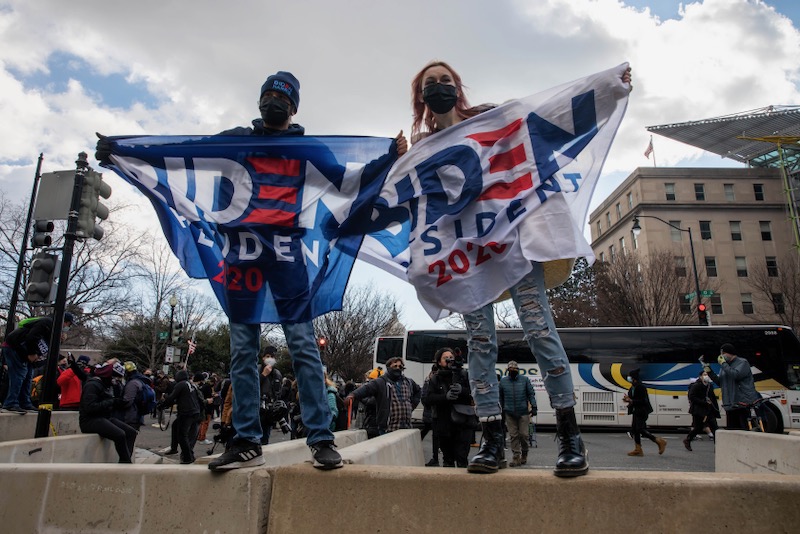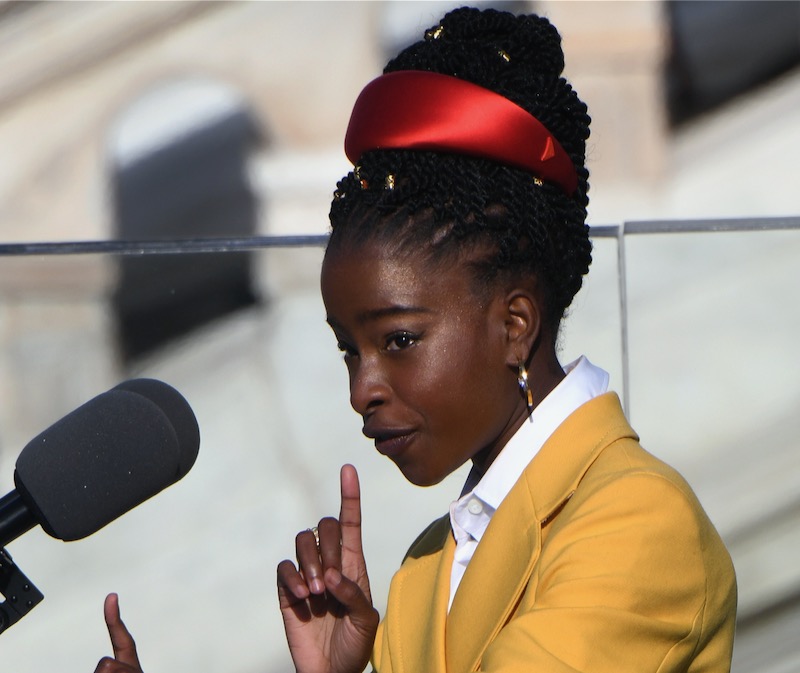It was a presidential inauguration where Catholicism was on full display. From the Catholic Latina Supreme court justice swearing in Vice-President Kamala Harris to Jesuit priest Fr Leo O’Donovan’s invocation prayer. Both were followed by the soaring, moving poem of 22-year-old laureate Amanda Gorman, a Black Catholic member St Brigid’s Church in Los Angeles. Even Lady Gaga and Jennifer Lopez, who both sang at the 20 January event, are Catholics.
All of this took place during a ceremony to swear in President Joseph R Biden, the first Catholic to be elected to the office of president in 60 years. In his inauguration speech, Biden quoted Saint Augustine, the bible, the need for unity and the value of objective truth. And before being formally inaugurated into the highest office in the land, the Democrat president began his day by attending Mass, to which he invited Senate majority leader and Republican Mitch McConnell along to.
So it might surprise those not plugged into the internal politics of the Catholic Church, that within minutes of Biden being sworn in the leader of the body representing US bishops assailed the new president for policies which he said “would advance moral evils”.
Archbishop José Gomez, President of the US Bishops’ Conference, said these policies concerned “abortion, contraception, marriage, and gender” while adding that with the advent of a Biden presidency there is “deep concern” about the “liberty of the Church and the freedom of believers to live according to their consciences.” No such statement was issued by the US bishops’ conference when President Trump was inaugurated, despite Trump’s anti-life migrant policies.
The Gomez intervention also contrasted sharply with Pope Francis’ message to the new president, who stressed “understanding, reconciliation and peace” within the country along with the importance of the “common good” and care for the “poor, the vulnerable and those who have no voice.”
Francis, who was among the first leaders to congratulate Biden on his electoral victory, has much in common with the president. Both want to combat the divisiveness of nationalist populism, both support multilateral institutions such as the United Nations and both want to take concrete steps to protect the environment.
Inside the Vatican, understandably, there was a lot of concern about the tone of the US bishops’ statement, and how the points were expressed. Of course, not everyone in the Vatican thinks the same and some in Rome may have welcomed the tough, combative language in the statement.
But top-level officials in the Vatican were alarmed. Gerard O’Connell of America Magazine quoted one saying: “It is most unfortunate and is likely to create even greater divisions within the church in the United States.”
The Holy See, it should be pointed out, was not opposed to the US Bishops making the statements about abortion – Biden’s policy on abortion is a disappointment to many Catholics.
But the US bishops' conference had initially planned to release the statement both before the inauguration had taken place and before the Pope had responded. It was the equivalent of kicking mud in the face of the new President of the United States.
Rather than seeking to engage in a genuine dialogue with the incoming administration in an attempt to shift policy on abortion, the Gomez release looked like political grandstanding designed to satisfy some Catholics who believe Biden is beyond redemption.
But it now looks as though Archbishop Gomez and the bishops’ conference leadership might have over-played their hand.
In response to the attack on Biden, Cardinal Blase Cupich of Chicago took the brave, and unprecedented step, of describing the Gomez statement as “ill-considered” and had been released without due consultation. Breaking ranks with fellow bishops is highly unusual, and one most prelates are loathed to take. He was not the only one to take a stand: several other Church leaders released statements which were markedly different in tone to the one from the conference.
In some respects, as John Allen points out, the differences among the bishops reflect the fault lines among Catholics. On the other hand, bishops are not just called to mirror their flocks, but lead them, and to provide unity. Right now, the leadership of the US bishops’ conference is doing the opposite.
President Biden, meanwhile, has quoted Francis in his speeches and speaks openly about his faith. Soon after he moved into the Oval Office, the president placed a picture of him with the Pope among the family photos behind his desk. The danger is that the president will end up looking like he’s more supportive of the Pope than some of the bishops. What does that say about the communion between some in the US hierarchy and Rome?
After Cardinal Cupich’s intervention, a number of bishops quickly gave their public backing to Archbishop Gomez’s statement. But by doing so they have revealed their antipathy to the Francis pontificate. It is not the first time.
In 2018, when Archbishop Carlo Maria Viganò released a dossier of accusations against the Pope and called on him to resign, a number of bishops came out supporting Viganò. One of those was Archbishop Salvatore Cordileone of San Francisco (who also backed Gomez).
Nevertheless, it is likely that the views expressed in the Archbishop Gomez statement, and those who back a hostile approach to Biden, will receive support in influential quarters of the US Church. As I write in this week’s Tablet, the Eternal Word Television Network (EWTN), has pursued a pro-Trump stance, and is likely to offer a megaphone to anti-Biden voices.
One of EWTN’s financial supporters, the Knights of Columbus, described Archbishop Gomez’s statement as “balanced and prophetic” while Tim Busch, an EWTN board member, has written an article saying that “collaboration on areas of common ground” cannot lead to “confusion over Catholic teaching other areas.” Mr Busch, writing in an article for the EWTN-owned National Catholic Register, also implied Biden should be denied communion.
The Hill We Climb, the poem read by Amanda Gorman at the inauguration ceremony focussed on unity. She said: “that even as we grieved, we grew/that even as we hurt, we hoped/ that even as we tired, we tried/ that we'll forever be tied together, victorious/not because we will never again know defeat/but because we will never again sow division.”
They are words that the US bishops conference leadership, and their powerful backers, would do well to ponder.



 Loading ...
Loading ...
What do you think?
You can post as a subscriber user ...
User comments (0)